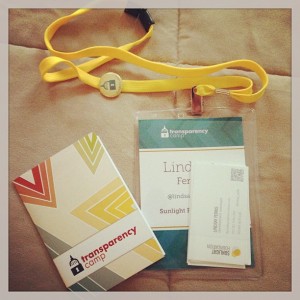Transparency Camp & Chinese aid
Last week l was in Washington D.C. to attend the Sunlight Foundation’s excellent Transparency Camp and present our plans for the 2013 Index. I also had a chance to meet with some of our campaign partners, mainly to put faces to email addresses but also to share notes on our various activities in the U.S.
The great thing about trips like this is that you have time on the flight to think about what you want to achieve (outbound) and what you actually achieved (return) and see how they marry up. Invariably I find I achieve more than expected, eat more than expected and come back brim full of ideas.
My week kicked off with an event at CGD to launch a new dataset of Chinese aid projects (not that the Chinese call it aid) which has set off a flurry of blogs about the pros and cons of using media sources to collect aid data. Of course my response to all this is predictable – if all providers of development flows published their information in an open, common format as they committed to by the end of 2015, then AidData wouldn’t have to resort to undertaking laborious initiatives such as this.
As things stand, China is unlikely to start publishing to IATI any time soon, so AidData should be commended on having a go at building a dataset, with all the difficulties and drawbacks that involves. At the very least, it’s fired up the discussion about the importance of credible datasets, the globalisation of aid and the need for donor harmonisation. A comment from one of the panellists at the event, Professor Yan Wang, on the difficulty of allocating costs to south-south cooperation, reminded me of a similar comment we received last year from Brazil in response to our 2012 Index, along the lines of “you can’t quantify technical cooperation” to which I say “doctor’s/teacher’s/engineer’s salary + their flight + their subsistence + the materials you provide for them to practice = cost”.
But aid data isn’t all about numbers.
It is also about results and impact, and making that information available to those on the receiving end of the projects. At the moment, the main source for this information is the media, so if you think AidData has got it wrong, tell them what other sources they might use and send them corrections as they’re keen to improve the dataset and “keep digging” (their words).
I also had meetings with various colleagues at the World Bank, who are working on an updated publication to IATI, expected shortly. This is welcome news as we’ll be able to assess the quality of this latest publication in time for this year’s Index, using our new Data Quality tool due to be launched next week. The World Bank Finances has started looking at the demand for open data. You can help them by completing their survey and telling them what financial data you’d find useful and why.
In all my meetings, there was lots of interest in our new methodology, what we’re scoring and how. When we first piloted the Index back in 2011, I never dreamed it would have the impact it has. For all the debate about the value of rankings, the Index has been critical in raising awareness of our campaign and we welcome the discussions it’s kick started with donors over the past three years. If you have any feedback on our plans for 2013, then please drop me a line.
And then I made it to Sunlight’s TCamp at the end of the week, which by all accounts was the best yet, with 500 participants from over 25 countries. My main fear at events like this is that such diverse and disparate activists will struggle to find common themes in their work and it ends up being a talking shop, but Sunlight made sure this didn’t happen.
Top tips for future conference organisers:

1) Get the attendees to organise themselves – let them set the agenda for each of the sessions and organise note takers;
2) Encourage people to vote with their feet – like the look of another session? This one not what you thought it was going to be? No problem – check the Googledoc and follow the Twitter feed to see what’s happening and where the buzz is;
3) Make people queue for lunch in the sunshine, that way you have to chat with others!
What other ideas did I come back with? The need for more outreach and networking events for the transparency sector – they work, we should do more of them; and hold a “Transparency Week” to highlight what we and others are doing in this sector. If you’re interested in helping us with either of these then please let us know.

